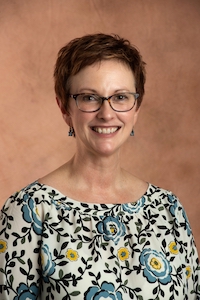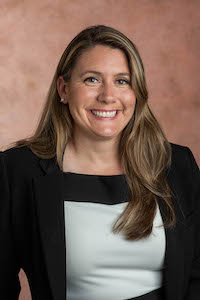
Two assistant deans have been named in the medical school’s new Academic Affairs organizational structure.
Kristine Gibson, MD, has been appointed in the new role of assistant dean for Clinical Competency and Interprofessional Education. Kathryn Redinger, MD, has been appointed the assistant dean for Clinical Applications.
Dr. Gibson’s title is new within the medical school and is designed to develop a longitudinal framework to follow students in competency development from their arrival at WMed until they graduate and move on to residency training, said Michael Busha, the medical school's senior associate dean for Academic Affairs and chief academic officer.
WMed’s Class of 2027 will be its ninth incoming class, and with that class comes curriculum adjustments at the medical school, Dr. Busha said. WMed will reimagine its clerkship phase to include integration strategies, preparation for residency, focusing on health equity, social justice and other broad areas of medical education.
“We are leaving an era of graded medical education and entering an era of competency-based medical education that is more about hitting milestones and hitting competency benchmarks,” Dr. Busha said.
In addition, Dr. Busha said, the new leadership structure allows medical school leaders to consider growing the medical student class and, hopefully, retaining more medical students to train within WMed’s residencies.
A national search is underway for WMed’s new associate dean for Undergraduate Medical Education. This role will develop and implement the medical school’s MD program, including program operations, student performance, program evaluation, faculty recruitment, clinical site recruitment, Liaison Committee on Medical Education (LCME) accreditation and faculty collaboration. Both Dr. Gibson and Dr. Redinger will report to this role.

In her new role, Dr. Gibson will oversee student clinical competency development across the MD curriculum and will implement interprofessional education events. Dr. Gibson is an associate professor in the medical school’s Department of Pediatric and Adolescent Medicine and she is a pediatrician who sees patients at WMed Health.
Dr. Gibson said she looks forward to developing a longitudinal, cohesive curriculum for clinical skills development and interprofessional education that will strengthen collaborations with Western Michigan University’s College of Health and Human Services and the Ferris State University College of Pharmacy. In addition, she will work with the medical school’s preclinical skills educators and clerkship directors to develop longitudinal benchmarks for student assessment and enhance feedback opportunities for faculty members.
To that end, Dr. Gibson will study best practices to ensure WMed’s teaching and assessment strategies align with program objectives and our students focus on developing into strong clinicians. “I think the new curriculum that is being developed around health equity will give us opportunities to rethink how we talk about interprofessional education and how we appropriately capture the skill attainment of our students,” Dr. Gibson said.
By moving into Dr. Gibson’s former role as the assistant dean for Clinical Applications, Dr. Redinger will oversee clerkships and electives in the MD curriculum. In her former role, Dr. Redinger served as the clerkship director for Advanced Emergency Medicine, a clinical skills educator and a clinical academic advisor. She is an assistant professor in the medical school’s Department of Emergency Medicine and a practicing emergency medicine physician.
Dr. Redinger said she will work with clerkship directors to oversee operations in medical students’ third and fourth years at WMed, and bring the skills she used as clerkship director for Advanced Emergency Medicine to the rest of WMed’s clerkships.
“We have opportunities for growth in making that transition from new medical school to a more established academic institution,” Dr. Redinger said. “I want to see us have more consistency in how we evaluate students, so that when they go from rotation to rotation they have a better idea of what to expect. I’d like to expand our clinical offerings and clinical sites for students and maintain good relationships with the community physicians who have helped build WMed to what it is.”
